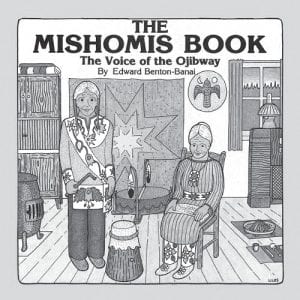The Mishomis Book: The Voice of the Ojibway weaves Anishinabe history, culture, and traditional stories into the first-person recollections of Mishomis, an Ojibway Indian handing down the teachings of his grandfathers. It begins with creation stories and ends with recommendations on how the Ojibway culture can contribute to the modern world.

Boo-zhoo’ (hello), my name is Mishomis. I am an Ojibway Indian. I live here in my cabin on the forested shores of Madeline Island. … Many years ago, my Ojibway ancestors migrated to this area from their original homeland on the eastern shores of North America.
…I am preparing this place to be a place of rebirth for traditional Indian ways. I am preparing myself so that I might remember the teachings of my grandfathers. I would like to give these teachings to you. I believe that, together, we can begin the journey back to find what many of our people left by the trail. …I do believe that with the teachings of yesterday we can better prepare ourselves for the uncertainties of tomorrow.
Anyone – adult or child– interested in the history and culture of the Ojibway (Anishinabe) people will find The Mishomis Book: The Voice of the Ojibway by Edward Benton-Banai (University of Minnesota Press, 2010) interesting and enlightening. Benton-Banai goes back – way back – in telling tales of the original people on earth and the mission they were given. Within his stories is wisdom regarding the nature of man, relationships, and finding meaning in life.
One of Benton-Banai’s stories is about how “Anishinabe,” the original man, learned about fire from the Firekeeper, who told him, “…Fire is a very special gift from the Creator. If you respect it and take care of it, it will take care of you and bring you warmth. But locked up in this goodness is also evil. If you neglect fire or use it in the wrong way, it could destroy the entire Creation. Many things in life have forces of good and evil locked up in them.”
The storyteller goes on to tell about the Great Flood the Creator sent to purify the Earth when its people turned to evil ways. After the flood, some of the animals and “Waynaboozhoo,” or the spirit of Anishinabe, survived by floating on a log. They were saved by a meek little muskrat who gave his life retrieving some earth from the bottom of the sea in order to form a new land, held up by Mi-zhee-kay’, the turtle.
Waynaboozhoo traveled all the way across Turtle Island – from the Atlantic Ocean to the Great Lakes to the Great Plains and the Rocky Mountains. He encountered Bug-way’-ji-nini (“wildman”), known to some as Sasquatch, who said he would be known only to the Anishinabe people. He learned about the relationship between the health of the spirit and the health of the body and the importance of only putting clean things into one’s body. “The spirit is an extension of the Creator and the body is its Sacred Lodge,” the storyteller says. “Life is not whole until its totality is comprehended. When the physical part of life that we can see is taken with the spiritual part of life that we do not so easily see, then life can be full and complete for each of us.”
Waynaboozhoo received the gifts of wisdom, love, respect, bravery, honesty, humility, and truth from seven grandfathers. “Waynaboozhoo realized too that no matter how much he could experience and learn in life that there would always be more learning and new experiences ahead. He knew now that the road to knowledge is eternal.”
The author talks about the interruption in Ojibway culture and traditions since the coming of the white man, the damage to the environment that modern technology has wrought, and how Ojibway culture could help bring healing. He says, “It is becoming more and more evident today that many Americans feel the philosophy advocated by traditional Native people, the respect for all living things, is a roadblock to American progress.”
The storyteller discusses an ancient prophecy that speaks of two nations joining to make one mighty nation. “If we natural people of the earth could just wear the face of brotherhood, we might be able to deliver our society from the road to destruction. Could we make the two roads that today represent two clashing worldviews come together to form that mighty nation? Could a nation be formed that is guided by respect for all living things?”
It is good that in spite of all the changes that modern life has brought to Indian people, that there are those who keep strong the gifts of yesterday. For it is with yesterday that we learn for tomorrow.
We can tell about our future as Indian people by looking at the wolf. It seems as though the wolf is beginning to come back to this land. Will this prove that Indian people will cease to be the “Vanishing Americans”? Will Indian people emerge to lead the way back to natural living and respect for our Earth Mother?


Loading Comments